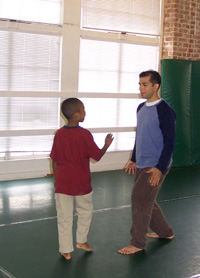

Learning Can be a Process that is Both Fun and Disciplined
|
During my years as a tutor, I came to question many assumptions in the approach to education within which children are indoctrinated, and the system within which many of us, as adults, had been raised. For instance, there is a great deal of time and resources placed in drilling and repetition, though it is unclear how this aids in growth and contributes enthusiasm to the learning process itself. |
|
One rarely asks, 'How can learning be a process that is both fun and disciplined?' |
|
When confronting learning difficulties, academic challenges, or other blocks to academic and/or personal growth, mindlessly repeating drills is simply not enough. Often, a radical approach is needed to breakthrough, something never been tried before. It is in this area where I am best at service, and where the application of what I teach has had the greatest success for my clients. To learn more about clients' experiences, please visit my Testimonials page. |
|
|||
|
In my opinion, Aikido is the study of relationship - be it relationship to another, to oneself, to the task at hand, or to the world and universe in general. It is the act of blending with forces that seem to be in opposition, but are, in truth, a part of you. It would be to limit the art if it were only considered as a form of self-defense. The philosophy of Aikido and the principles upon which it was founded can be applied to any and all aspects of life. Aikido and psychology are the two great lenses through which I perceive the world. |
|||
|
|||
|
This "rush of energy" is the same when one is confronted with an opponent, whether that opponent is a math test, an English paper, the school play, or a soccer game. The context and situation may change, but the process of overcoming the fear is always the same. Aikido provides many of these tools to use in overcoming these performance anxieties. These challenges, therefore, provide an opportunity to overcome the reactions that appear not only in this localized area of the block, but in many areas of the student's life. Learning life-skills to help to overcome current blocks assists a student to get past these anxieties, builds their self-confidence, and gives them strategies to overcome future blocks in any aspect of life. The movement practices of Aikido promote comfort within one's body and an overall sense of empowerment. To find out more about Aikido, please click these links: City Aikido, Aikido of Marin, Zanshin-ryu. |
| What
is Meditation? Mediation is nothing more and nothing less than becoming aware of what is happening in the present moment. It's an opportunity to relax, focus on one's breathing, the ground that supports one's weight, and any area of the body that holds tension. It is a completely non-denominational practice that can, though not necessarily, comprise a spiritual dimension. Meditation shows the benefits of a calm, present mind in dealing with test anxieties and other pressures. I therefore begin all sessions with a meditation. Meditation also aids people to enter into Alpha Brain States. I believe practicing this shift of brain states is particularly helpful for children who are very active and/or have Attention Deficit. There is a lot of scientific data on brain states, and if you'd like to find out more about this, please visit these links. |
 |
 |
What
is Educational Psychology? Educational psychology is a growing field that combines education and psychology. It is often used as an intermediary step between the two disciplines, or, sometimes, as a liaison between the education system and clinical psychology. While I am neither a licensed psychologist nor an official of the school system, I often work with professionals in both sectors as a team member who supports a child's development. I employ psychology in my approach as it can help to shed light on reasons why a student might be experiencing forgetfulness, feeling unmotivated, or overburdened by fear, etc. |
| What
is "Body Intelligence"? Some might call this intuition building. Either way, this technology helps to develop powerful tools and confidence in areas of challenge. As an example, a student who is challenged in reading and pronunciation will still have an implicit ability to know when a word is pronounced correctly or incorrectly. There's an internal feeling in the body that provides this feedback (some children report feeling a tingling sensation in their abdomen or chest). I often work by helping a student develop their ability and confidence in recognizing this sensation, and guiding them through this process. When they know, inherently, that an answer they have chosen is incorrect, and they feel this inside of them, then they know to give that question or problem more attention until this sensation subsides, or until another sensation (which they've learned to associate with a correct answer) surges through them. Body intelligence also means that there is a whole system of awareness that is intelligent; intelligence does not reside solely in the brain. While the brain is certainly a piece of this intelligence, full body intelligence is much larger than the brain alone. Body-centered learning places importance on physical posture and alignment when reading and studying. Through this way of learning, using movement, stretching, and breathing, students learn and recall information more effectively. |
  |